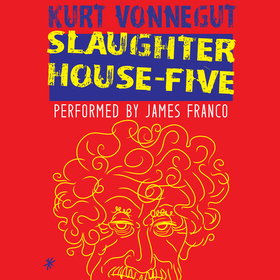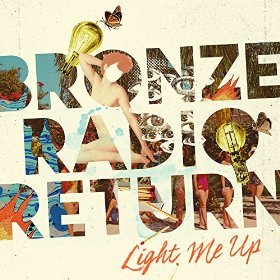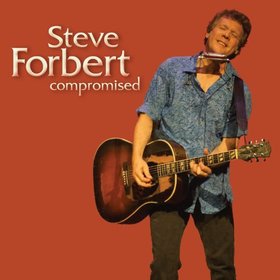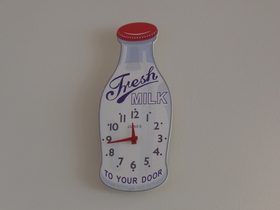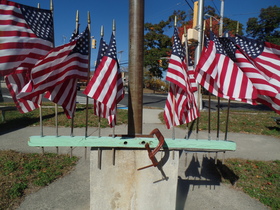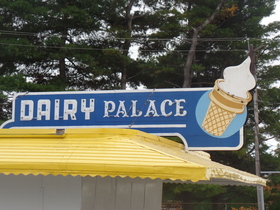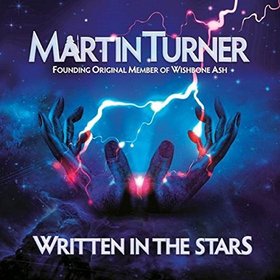JAMES FRANCO INTERPRETS SLAUGHTERHOUSE-FIVE
Kurt Vonnegut's Slaughterhouse-Five gets the James Franco treatment on Audible Studio's audiobook version of the classic. Vonnegut's breakthrough masterpiece brought him international praise and cult status, and Franco's read personalizes the adventures of Billy Pilgrim with a mix of innocence and eventual world-weariness. The below is an exclusive excerpt from the audiobook that gives a taste of the actor's performance...
The performance can be downloaded at http://www.audiblie.com
********************************
A Conversation with Bronze Radio Return's Chris Henderson
Mike Ragogna: Chris, Light Me Up, the album not the suggestive overtone, is your band's, what, 20th album? What's the secret to a Bronze Radio Return album these days?
Chris Henderson: This is our fourth full-lengther. As for the secret, I don't believe there is one. We are a band of six guys that like writing and playing music. When it comes time to record an album, I enjoy the change of pace from touring. It's a different kind of energy we use to record an album.
MR: Would you take us on a tour of the new album, its material and recording process?
CH: The new album was recorded roughly a year ago starting in a small town outside of El Paso, Texas. We spent about a month there working out about 15 songs. It was the perfect environment for us...remote, unique and very removed from our daily norms. In between our recording hours we would explore the region with hikes and bike rides. It was a great way to feel refreshed throughout the day. From El Paso, we all flew home for Thanksgiving and took about 10 days off. We reconvened in Norman, Oklahoma, at our longtime producers' studio--we recorded our album Shake Shake Shake there. We spent another 15 days or so there finishing up the tracking of the songs. After doing a Secret Santa on the last day, we flew home just in time for Christmas and had another couple weeks off. From there, I went back to Oklahoma a couple times to finish some vocals and get everything buttoned up. The material on this album was initially conceived in Hartford and Maine, recorded in El Paso, Texas, and finished in Norman, Oklahoma.
MR: Any challenging or surprising moments during Light Me Up's creation?
CH: We ended up with 17 finished songs which felt great to have the extra material. The hard part was choosing which songs went on this full length album. We flirted with the idea of releasing an EP in the fall and a full length follow up next year. Ultimately, we decided to release ten tunes, hold on to seven and go back into the studio next year to round out another album.
MR: How did you approach this album differently than past projects?
CH: For BRR, we try to make each album recording experience different. Our first record was done outside of Nashville, TN in a somewhat swanky studio. The second album was fully recorded in Norman, OK. The next was done on a goat farm outside of Charlottesville, Virginia, and this one was mostly recorded on a Pecan Farm in El Paso. I think there is an important "x factor" that comes from being in a new environment. My senses get heightened when I am in a new place. I like feeling like I am on my toes while we record. One of the new approaches we tried this time around was taking a small break in the middle of our recording time. This allowed us to step away from the material and come back with fresh ears.
MR: Do you have a favorite song or creative moment on the album? Did any songs evolve from the original vision to something totally unexpected and what was your reaction during the process?
CH: One of my fondest moments during the recording process was getting all of us to climb up and into this old water tower. We brought a laptop and a few microphones out there and sang various parts of songs in the lush reverb of the tank. There were snake skins all over the place and the only light that came in was from bullet holes on the side. It was an experience. As for songs changing, we have this song that didn't get released on this album that started off with a slower tempo and a slightly more relaxed vibe. One day someone joked that it would be fun to throw a marching band on the chorus of the song. We all laughed and then the house engineer spoke up and said "my friend conducts a high school marching band. Should I call him?" Fast forward a week and we were recording a high school drumline marching band in the studio. Didn't see that one coming...
MR: The band had some awesome breaks, its recordings featured in commercials, TV and film. What are some of your favorite uses?
CH: We have been really lucky to involved with some great placements. It's hard to have a favorite, but any time your music is used in a scene where Bill Murray is dancing is pretty sweet. That happened in the film St. Vincent.
MR: What keeps Bronze Radio Return's creativity fresh?
CH: In the studio, we stay fresh by not being afraid to try new things. On this album we tried some new textures and sounds. I would imagine that some people will say, "This sounds different!" For us, we embraced some of the things that make this album sound different. It was refreshing to know we could expand the artistic box we live in.
MR: Do you look at what's happening in pop music and feel competitive? Do you possibly get inspired from productions, arrangements or songwriting you hear and how does that translate into Bronze Radio Return music?
CH: I do not feel competitive listening to pop music. There are times when I hear a song and think "man, we could have totally done that," but someone got there first and that's fine. I think it's a slippery slope when art starts getting competitive. The inspiration I hear in production and arrangements these days is mostly aimed at how certain artists can make something memorable in an age with a lot of content. With so much music out there, it so vital to make sure the listener leaves your music with some kind of impression...maybe a melody, a sound, or a lyric.
MR: What advice do you have for new artists?
CH: Well, I still feel like a new artist so I would tell my fellow new artists "It's not what you see, it's how you see it." Sometimes that seemingly empty room at your show will have someone who can make an impact in it. Sometimes that streaming service that doesn't pay your rent will still drive new people to your shows. Sometimes that song you weren't going to record becomes the first single on the album--for us, that was "Further On." Keep an open mind and a fresh perspective.
MR: What's the best advice ever given to you? Did you take it?
CH: I've been given a lot of good advice over the years. I'm fortunate enough to be surrounded by really smart and inspiring people. Rather than spoken advice, I think I learn more from watching people live, work, and progress.
MR: Where is this all heading?
CH: Who knows? And that's what keeps me coming back for more.
******************************
A Conversation with Steve Forbert
Mike Ragogna: So this album is called Compromised. Do you feel compromised in some way?
Steve Forbert: Well, it's really more in the sense of I'm sixty years old. You can see me on the cover, singing away, I'm a little bit compromised by the decades and the miles. That would be the use of the word. I can't claim that I've compromised much here. I know it's a bit vague. It just seemed like "Compromise" had to be the lead track, it's pretty typical of what I do and it became the title song really, but we called the record Compromised with a "D." That highway between Tuscaloosa, Alabama and Meridian, Mississippi is a bit compromised.
MR: [laughs] What's the story behind "A Big Comeuppance"?
SF: That one's really just a big mystery. I was listening to one of those Neil Young Americana Crazy Horse versions of something like "Oh! Susanna" or "Clementine" or something, and I just thought, "I could write that sort of song." I don't know why, but I just got that phrase in my head, a big comeuppance."
MR: By the way, I've yet to Google it, but you might have written the first song ever with "comeuppance" in the title.
SF: I'd like that to be true, but at this point there's so much out there. Even Tin Pan Alley covered so many clever uses of words, I would be really shocked if it's never been in a song, but it hasn't been in a song since 1957 or something. A Sammy Cahn or an Irving Berlin might use such a word.
MR: While we're on the subject of comeuppance, do you think those who deserve it really ever get it?
SF: People get in trouble. They eventually get in trouble, so what goes up must come down.
MR: And then you "Send In The Clowns." So to speak.
SF: You might say. I've wanted to do that song for about five years now. I taught it to the band that's on this record and Joey Spampinato said, "This is working, you gotta record this," so we did. As you know, we got John Simon to come and help us with the basic first wave of recording on the floor live in Woodstock. So that was a real asset, he helped us immensely.
MR: That was an interesting take, but it made so much sense after hearing it. Who could've realized that that song with that tune and those lyrics could also be almost a folk rocker?
SF: Almost a folk-rocker, because the lyrics are pretty sarcastic. I wanted to do this for a few years now. There's one other beautiful song that Frank Sinatra recorded called "Once Upon A Time" that I want to get to also.
MR: I love that you went back to using John Simon. I feel that this album fits in the chronology of your first few albums. John Simon was instrumental in the second album, right?
SF: Well, he did Jackrabbit Slim, and he got pretty mad at me when I didn't ask him to produce the third. In retrospect, okay, it certainly would've been a good move, but I was in my early twenties and I had been working with a head full of ideas for years and I had some things I wanted to try, so the next thing was to work with an English producer and Pete Solley was producing The Romantics for Nemperor Records so that was just a natural thing on my list of things to try. Someone who had been a member of Procol Harum briefly was interesting to me. So all this time I tried to get John Simon to help us with the last record called Over With You, but it was pretty short notice. A few years went by, we got ready for this and I was able to get John to give us a window of time and we got what we needed on tape so to speak and then he went to Florida because that's where he and his wife usually winter. It was great to come back and spend a lot of time going over the songs with John beforehand in preproduction and all of it was fun.
MR: Did it feel like the old days when you worked with him?
SF: Yeah. And he's a little bit mellower and I like to think I'm a little bit more manageable. Anyway, it went fine.
MR: Actually, when I heard the new album, my first reaction was this could've been your third album. It fits into how you arranged songs back then.
SF: Some of that might be because I actually had a working rock band involved in this, too. It wasn't, "Call up some talented people or some friends in Nashville and get them together in the studio," it was, "We're going to do an anniversary tour for Jackrabbit Slim in October and since we're kind of on steroids right now let's also record an album." I think that gives you some of that, too.
MR: What did you discover about Jackrabbit... when you revisited it?
SF: That was about this time last year. It held up fine. We did about eight shows just playing it in its entirety. I didn't have any problem with it. It wasn't like, "Oh God, if only I didn't have to do these two," or something. It's a good record. I'm still pleased with it.
MR: It really seems like you've dug in on the writing on Compromised. "Drink Red Wine" and "Welcome To The Rolling Stones" have some really clever, pointed lines.
SF: All of this was written before we even had the idea of recording with the touring band that we had at the time. I almost think it was just like, "Listen, I'm going to give this one everything I've got and it's going to be a little more barbed," because the last one was pretty mellow and we had to record it in three days and the previous one, The Place And The Time I'd honestly like to re-record. I like those songs, but to me the record just didn't really sell the songs well enough if you will. I was just kind of angry. I don't know how many more records I can manage to organize, and you know how it is to go in and spend this kind of time and effort making a record with who knows what kind of possibilities out there at age sixty. Rather than let that make me pessimistic, it kind of just made me a little angry.
MR: I don't know, your contemporaries, folks like Janis Ian, Rickie Lee Jones, they're older than you but they keep making new projects, they stay out on the road. And you still have formidable fans who will come and see you if you tour. I don't think it's a, "How many do I have left," sort of question, I think it's a, "What other adventures can I have as a creative musician," question.
SF: Well I don't mind agreeing with you, because I went to Cuba about five weeks ago exactly in terms of what you just said, "What other creative ideas might I find to make music?" I just went down there on an exploratory trip and that may lead to something. Then I had to go to England and Scandinavia for a month so when all the dust settles I'll be able to process what I learned in Cuba and the musicians I heard and maybe go somewhere with a fun thing with that. But you just never know. I've made sixteen albums now and instead of resignation this one came off a little bit angrier.
MR: Maybe that's why I'm feeling Complicated dug in deeper. You were a little more idealistic in the earlier days, but I think your old sense of sarcasm reappeared on this record.
SF: That's good. I've heard about all the people putting out records this season, I hope it lasts long enough that people can explore this record and it's not allowed to disappear too quickly. I think it really is a good record. I like it and I've lived with it a lot and I think I'm going to continue to like it.
MR: So maybe taking the cue from your Cuba trip, what do you think about a Latin Squirrels album?
SF: Well, you're looking down the road. Once I can let the dust settle I'll look at it. I'll have to find something really organic about it, but it is a beautiful place and there's a lot of beautiful color in old Havana. I took a lot of photographs. It's going to be in the news, it's in the news every day. I don't want to go on a long talk about Cuba but it's remarkable how happy the people are and how safe you are just walking around all parts of the city. They've been under this embargo for so long but their attitude was just wonderful.
MR: What did you discover about yourself while recording this new album?
SF: Songs like "Whatever, Man" are a little bit angrier, they say the lord helps those who tend to help themselves to more than anyone might need. A few things came out like that. There's one on there called "When I Get To California," which is a personal emotional treatise at this time. What's that word for grumpy?
MR: Curmudgeon?
SF: Yeah! I don't think I've gone that far, but you know, you can see a little bit of my patience wearing a little thin.
MR: How can they not? Go visit a news site and you'll see how hard it is not to be cynical.
SF: Yeah, and I do try to follow things and I do try to be optimistic or at least try to reason them out or at least try to make sense of the various moving pieces of the puzzle but it does get harder and harder. I guess that's probably because the world gets smaller and smaller because with every action there is an equal and opposite reaction, but it's a challenge. Bob Dylan said years ago, "Sometimes it gets so hard to care, it can't be this way everywhere." You don't want to live like that. I know people who do.
MR: Well, you're the guy who wrote "The Oil Song" in the period where it felt like you could still affect policies with a song. Now there are so many issues we see every day, I think it could be too draining to decide what you can put your power, energy and creativity behind.
SF: True. I can't say anything but I agree. There are some things right now, but I don't want to talk about them because it's bad luck to talk about a song before you write it. But I can go, "This I could comment on."
MR: How is the live show evolving?
SF: To be perfectly honest, I'm fixing to play solo for the rest of the year. Honestly I don't have a band budget and I can't really take a band to St. Louis or Des Moines right now. I'm going to do a few shows with Leo Kotrke in the new year out in the Midwest, but honestly in that realm there's not a touring band up and ready to go, I'm just going to keep it low profile and see how the record does. I'm going to play New England starting next week and I'm thinking about putting together some kids I've met down here that are really good on the Jersey shore and rehearsing under the radar and getting a little combo together for maybe some shows in the spring. Right now honestly I'm just going to play these songs and get to know them and let them grow a bit, just solo and watch and see how this record goes. Just to be frank, I'm not going to put a bunch of super expenses into a touring entourage right now when I don't really have the visibility to pay for it, period.
MR: It works in your favor, no? I think people are coming to see live acts for a different experience anyway. They're not looking for the regurgitation of an album because they can always buy the CD. Live shows are something that most fans can't get any other way.
SF: Yeah. I just have to be realistic about it.
MR: Are there any new acts out there that you're keeping an eye on or listening to casually?
SF: This might disappoint you, but there were a couple of real winners on Mark Knopfler's latest record, Tracker, and to my knowledge I think those escaped people. There's one called "Broken Bones" that should've been all over the radio. It should've been a great single. I don't mean necessarily on that crazy, wiped-out, day-glow Top 40 format we have now, but people should've heard a song called "Broken Bones." There's a guy here on the shore named Stringbean who's got a really good blues record out, he's a harmonica player, a good one, that's good. I thought Steve Earle's last record had some fabulous stuff on it. It was a blues record, but whatever, to me it was a rock 'n' roll record. It had a great attitude, a great sound. I thought that was an excellent release from him.
MR: Because I have a kid, I get exposed to pop radio all the time. There's a guy, Andrew McMahon who's really popping out of that Top 40 scene for me. The quality of his recordings is superb. It reminds me of the days when Bruce Hornsby had "The Way It Is" and Tracy Chapman had "Fast Car." It seems like every once in a while, you're on the verge of something cracking through, expanding kids' musical knowledge and tastes beyond pop.
SF: Father John Misty, that's a good record, I've heard some of that...I've even listened to Tame Impala. I'm always looking for a good song from anybody. Joanna Newsom's got a new record out, I'm hoping it will be good. She's certainly a brilliant lyricist.
MR: Have you been tempted to team up with or produce or mentor some of these kids?
SF: That's a thought...that's a thought. There's a kid who I think is good, he just did a couple of shows with me.
MR: Steve, what advice do you have for new artists?
SF: You've got to follow your dream. I would never discourage someone from following a dream, especially if you're younger. Go for it, but you've also got to be aware that the digital revolution has changed things a lot. It's easy to look at the history of folk rock and rock 'n' roll and the wonderful time we've had and be inspired by it because so many real talents have done such good work within it, but it is a different world now. I know it's a cliché but it seems like there's so much more accent on maintaining your profile and the digital revolution of the music industry has made it hard for the songwriter to focus on the songs and the heart and soul of it. We used to have people that took care of the publicity angle of it and the radio promotion. It's hard for a young artist to come along now. Jason Isbell is doing really well right now, but I guess what I'm trying to say is people have all these things to do now and it's a changing world. It's always a privilege to be able to be creative and do anything like that for a living, but I just don't know if there's the same reward in it anymore. You just have to watch out, because it's real self-conscious now. So much has been done and it's all grown up so it would take a really special person. Joanna Newsom's first record was amazing. That's the kind of bar you should set for yourself. Does that make sense?
MR: I hear you, get into it because you need to be creative, but if you're going to commit to it, be sure you can commit to it in this particular environment.
SF: Yes, Mike, thank you. It's a very guarded optimism, yes.
MR: What do you think as far as young Steve Forbert? What would you have told that guy?
SF: I find it hard to answer that without mentioning this memoir I've just about completed. The truth is some people were interested in putting together a shot at maybe writing a play around some of these songs and the Greenwich Village meets CBGB's thing I was a part of and I was kind of crossing between those two lines, East and West Broadway in lower Manhattan, but I got into a lot of dwelling on and going through and remember stories and getting into the past and all that so everybody's writing these memoirs now--Rodney Crowell all the way to Chrissie Hynde. Mine is not going to be super long, but I wanted to get down some of this. It's been difficult to go back and look at it all and be really honest about it. I was kind of a bull in a china closet. I had a whole lot of fun, but I really don't think I could answer your question, because the whole book is trying to answer it.
MR: That will be great since I don't think your whole story was told by your records alone. For instance, I think people really got the biggest clue on who you were from your live performances.
SF: What I can say is that if I had known, and this is true for anybody, and I say this in the book, you can say, "Oh gee, be young, be foolish, be happy," because if you knew what you know now then, certainly as a songwriter and a singer you wouldn't want to. That's just not the way the equation works. As a songwriter and recording artist, if Chrissie Hynde knew then what she knows now, or pick anybody, you just wouldn't have the carefree records that we love to listen to over and over again.
MR: When is the book coming out?
SF: Maybe in the Spring, we're nearly done with it.
MR: So what else do you want to do, after the tour and the book?
SF: Being able to take photographs is a luxury, I really enjoy that, but I just want to keep playing. I want to keep playing and I want to enjoy shows that are really spontaneous. That's what I like to do as a so-called folk troubadour. It's so much fun to just let each night play itself and to not have to follow spotlight cues. The audience is there because they really want to be there, we've talked about this before, so I just want to keep doing that for a good long while. But it sure is fun to be able to see something you think is quirky or colorful or symmetrical and take a photograph of it. People for centuries and centuries and centuries never had that option.
MR: Same thing with the home recording studio.
SF: That's right. We don't even know what Stephen Foster sounded like.
MR: [laughs] I never thought of it like that.
SF: That's a wonderful modern day luxury that we have. People existed forever and ever without being able to capture anything except in the regular work that they had to do at murals and sculptures decorating the pharaoh's tomb, but people are now able to capture so much it's quite a luxury compared to what people have had at their disposals forever.
Transcribed by Galen Hawthorne
The following photos were taken by Steve Forbert, © 2015 Steve Forbert
******************************
A Conversation with Martin Turner
Mike Ragogna: Martin, your new solo project Written In The Stars is basically a collection of prog-rock, guitar-based workouts. The lyrics of those songs with vocals get pretty cosmic. Would you say there's a narrative running through the album?
Martin Turner: Well, our star gives us warmth and light. So too can individuals who have "star" quality as many people do. I have become fascinated by the amount we have discovered about our solar system and the universe in general in the last couple of decades. The advent of ever more powerful telescopes and their computerized sophistication allows us to uncover many of the mysteries in our realm. With all this knowledge there is still an energy, some call it "dark," some call it "God" that remains mysterious. What I believe is that everything is written in the stars--the story of our planet, our solar system, our own individual existences--all existed in blueprint form and go through a protracted cycle of birth, life and death. I have used this "theme" for this album, both on a cosmic level and also on an individual level. Prog rock is a label that came after Wishbone started in late 1969, I have always thought of the band as melodic rock for want of a better description.
MR: How do you approach recording these days? How do you write the songs, format/arrange the songs before recording, and how do you accomplish your vision of what you think should be the resulting project?
MT: I usually make "sketches" as I call them, on some cheap + easy format. Writing for me is a bit of a weird one. I have to get in the zone, almost like a trance state and when I do the lyrics in particular come to me from the cosmos or somewhere external, I am merely the conduit through which this energy arrives. This is about the only way I can explain it. Psychic acquaintances refer to it as "channelling." For instance, when I wrote the lyrics for WITS it came to me in a burst, maybe 5 minutes of writing as fast as I could. I am very into the recording process and quite opinionated about which format to use which in my case is an early digital recorder, but I use a lot of old analogue equipment, valves et cetera. When I am mixing, I would compare the process to sculpting and it is important to know when to stop. Therefore, yes, I would consider the music to be art, although that is maybe not always the case.
MR: Which song or songs completion became the paradigm for all the recording that followed?
MT: The song "Written in the Stars" was predictably the key track and all the other songs were I think measured somewhat as to whether they fitted the theme.
MR: Are there any particular stories you can share about any of the recordings, like how it may have evolved or how you perhaps scrapped one and started from scratch to set a new direction?
MT: Having not really made any "new" music with my band I had thought of them as performers somewhat and I was amazed at the level of creativity coming from all of them. We did initially record a couple of songs in a very live room but then switched to a dead studio environment which gave better results. My drummer Tim, wanted to try recording the drums as one big beast rather than individually miking everything separately. I had reservations about the lack of control but we tried it and the eureka moment came when I had gone out of the control room to make a cup of tea, as we English do. I heard the song from the next room and realised that if I had just walked in cold, I would have sworn there was a guy playing drums in the other room. Realness, is all I can call it, but it worked.
MR: Your title track and "Pretty Little Girls" sound pretty hooky, it's like you were aiming at radio singles with these. By the way, do you listen to current pop radio and do you
have any favorite recording acts or artists that aren't necessarily pop-oriented?
MT: "PLG" was a song that I had reservations about. I mean an old rocker like me singing about pretty girls. It is of course written as a father of six, four of them female and my observations of the sweet process of them growing up to adulthood. I listen to all kinds of music, pop, rock, classical, blues, ethnic music and even hindu music.
MR: What inspired Written In The Stars' songs and their themes? And how do you think this album relates to 2015 or does it even matter?
MT: When I say written in the stars, I mean it. I know I have a "wizard" like ability to take musical ideas and lyrics from the ether and craft them into musical form that goes back into the air. All rather magical because sound waves are invisible. I do not however claim to have much control over the creative process in that I struggle with it on occasion, but when it works it is very rewarding. Whether or not the WITS album matters is for others to decide, not me. Although the feedback so far has been flattering.
MR: Who are some of your favorite songwriters and do any of them inspire your current writing or approach to recording?
MT: Words are powerful weapons in the right hands. I have some old 17th century books on English history that are beautifully written and inspirational. I was very keen on Woody Guthrie as a young teenager and then consequently Bob Dylan. There are so many good writers of modern music, the '60s and '70s were inspiring for me although like most people I will get hooked on a song at some stage and it will stay with me always. Only a few days ago Jim Peterick [Survivor] was in London, we spoke on the phone and he mentioned a Wishbone song that he was impressed by and then sang me the first verse of "Eye Of The Tiger" a song that I loved as a rare pop song that was actually a great rock tune. A lovely moment--thanks Jim.
MR: I noticed the twin guitar approach on this album that was also admired about the group Wishbone Ash, which you co-founded. Do you find that employing that technique is more satisfying than single leads and does it help you experience the music you're creating more deeply?
MT: When Steve Upton and I formed Wishbone Ash we struggled to find the right guitar player, then decided on two, with a template of creating Harmony guitar parts. Because I had been brought up on mainly Russian Classical music, I found it very easy to sing what I call pseudo-classical melodies. When sung, they sound OK, but we discovered that when we transposed the melody to guitar and then sang a harmony, which was also transposed to guitar, the results were really strong. Different to how a guitar player would construct a part. It was a bit of a process but gave us a very identifiable sound. Referred to now as a signature sound Again, it boils down to melodic content, which is the only way I can do music.
MR: You've been with Wishbone Ash on and off over many years and you've taken your own vision of the group on the road. This is not an unusual story in rock, it now seems like the norm. So what is the dynamic between you and the band that sometimes makes things
complicated?
MT: After having started the band in the '70s and achieved world wide success with albums during that decade the band left me until we worked together again in the late '80s and into the '90s. My contribution aside from a few tours/appearances from then on was putting together albums during the '90s and up until 2003. Inevitably, I wanted to play live again and started again in 2005 with a new line up. I was not happy with the way that Wishbone Ash was being represented by our former guitar player form the '70s and decided to show people what the true spirit of the bands music was all about. This evidently did not go down well with my former colleague who armed with a European registration of the name, pursued an aggressive legal campaign to prevent me from playing music that I had composed and restrict me from any use of the name Wishbone Ash--a name that I was the author of and considered to be my intellectual property. The affairs of a rock band do not translate well in a court of law. Two different worlds. The carnage caused by the court case was severe and benefited no one I would venture to suggest. I am allowed to use the name in an "historic" context--after all, no matter how hard one tries, it is very difficult to rewrite history.
MR: Since you're a founding member of Wishbone Ash, what do you think its contribution to rock has been? What recordings or aspects of that band are you most proud of?
MT: I am sure there are people who are better able to be objective about WA's place in rock history. I do know that other bands--Thin Lizzy, Iron Maiden, to mention a couple, do acknowledge our influence on them. We were a band who blazed a trail in the '70s, both in Europe and the USA. Its worth noting that although we were British, we were managed by an American, Miles Copeland and signed to MCA/Universal in Los Angeles. So, we started from scratch on both sides on the Atlantic, dashing back and forth to tour fairly relentlessly during the first half of the '70s. A lot of folks in the early days thought that we were an American band. We did achieve an award in the UK of album of the year with the Argus album that went out in 1972 and has continued to sell ever since. That for me is something to be very satisfied with and I do know from correspondence just how much that record is loved. I was the main writer on the Argus album, so doubly rewarding for me personally.
MR: And when it comes to your solo career, what are you most proud of?
MT: There are no individual songs really. Different people have favorites. I am just happy to be able to bring my music to the world. That is what was written in the stars for me.
MR: Martin, what is your advice for new artists?
MT: Probably find something else to do. A career in music can take you to the highest and also be heartbreaking, so consider well before you go for it. Having said that I do know that there are people like myself whose fate will contrive to put them on the path of music. In that case do it to the max.
MR: What are your plans and what will you be focused on for the near future?
MT: More of the same, probably till I drop. I love music, it lasts forever.

